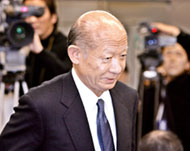Tokyo bourse shortens session again
The Tokyo Stock Exchange has again shortened its trading session for fear of being overwhelmed by the huge volume of sell orders, but the Nikkei index bounced back with a strong showing after taking a beating the previous two days.

An unfolding scandal at internet startup Livedoor Co and a market sell-off that followed are exposing a stunning weakness at the Tokyo Stock Exchange, which has been plagued with problems dealing with surging trading volumes as global investors rush back to the Japanese market.
Unable to process a flood of sell orders on Wednesday, Asia’s biggest bourse – and the world’s second biggest after New York – halted trading 20 minutes early, the first time the market stopped trading due to capacity problems.
Fearing a similar disaster on Thursday, the exchange delayed the start of the afternoon session by 30 minutes.
Those problems come just two months after a computer glitch on 1 November caused the exchange to suspend trading for all but the final 90 minutes.
Embarrassment to Japan
That shutdown was caused by a glitch in software that had been part of last year’s overhaul of the exchange’s antiquated computer system to deal with the explosive rise in trading. But it clearly was not enough.
Neil Katkov, group manager at consulting company Celent in Tokyo, said: “It’s an embarrassment not only for the exchange but for the Japanese financial industry as a whole and ultimately the government.”
 |
|
The session was cut short so that |
It could also drive away investors just as they have been drawn back to Japan amid signs of a long-awaited economic recovery.
Government officials minced no words in expressing displeasure.
Kaoru Yosano, the economy minister, said in a nationally televised news conference on Thursday: “A stock exchange that can’t carry on trading simply doesn’t deserve to exist.
“The exchange should make it a top priority to bring business back to normal.”
Nikkei bounces back
The benchmark Nikkei 225 index, which plunged nearly 6% on Tuesday and Wednesday, bounced back 2.3% on Thursday, marking its largest single-session point gain since June 2002.
The index hit five-year highs just last week after surging 40% last year.
Its two-day plunge was triggered by an investigation into Livedoor, a company that offers various web-related services.
|
“It’s an embarrassment not only for the exchange but for the Japanese financial industry as a whole and ultimately the government” Neil Katkov, |
The authorities raided Livedoor’s offices late on Monday on suspicion that the company violated securities laws in giving false information to inflate stock prices, and media reports say the company allegedly hid losses.
The scandal took a morbid turn when an executive associated with Livedoor, who was also being investigated, committed suicide in a hotel.
Takafumi Horie, the company’s 33-year-old chief executive, denies any wrongdoing.
Taizo Nishimuro, the Tokyo Stock Exchange president, blamed the problems on the Livedoor probe, adding that the exchange was in the middle of updating its computer systems.
He also asked that investors try to bundle orders as much as possible.
“We deeply apologise for the great inconvenience and ask for your kind co-operation.”
Livedoor shock
Some say the exchange’s decision to shut down trading on Wednesday was just as damaging to investor confidence as the “Livedoor shock”.
Business daily Nihon Keizai Shimbun said in a commentary on Thursday: “Such a stop in trading is unprecedented in the world.”
 |
|
Exchange head Nishimuro wants |
Executed orders came close to the four million capacity on Thursday. The exchange said it is currently working to boost its computerised trading system capacity to as many as five million by the end of January and up to eight million in the long term.
The New York Stock Exchange routinely carries out more than five million transactions a day, sometimes nearly six million.
Trading volume, a different measure, is usually a far higher number – often in the billions – because each transaction typically involves many shares.
Shinzo Abe, chief cabinet secretary and the top government spokesman, urged the bourse to fix problems promptly. “International credibility must be restored,” he said.